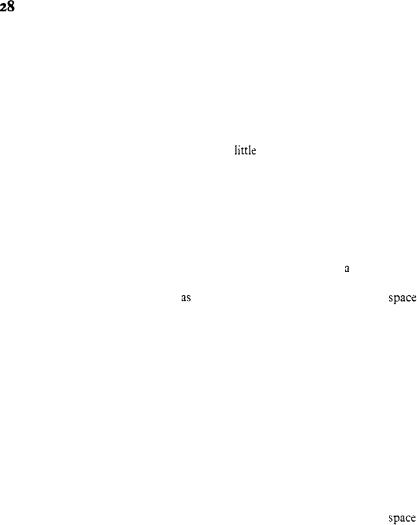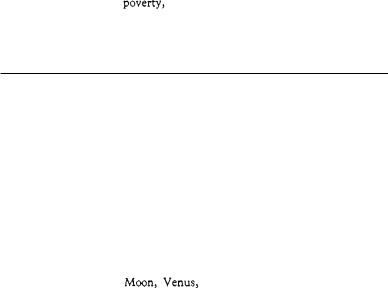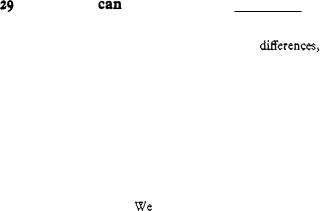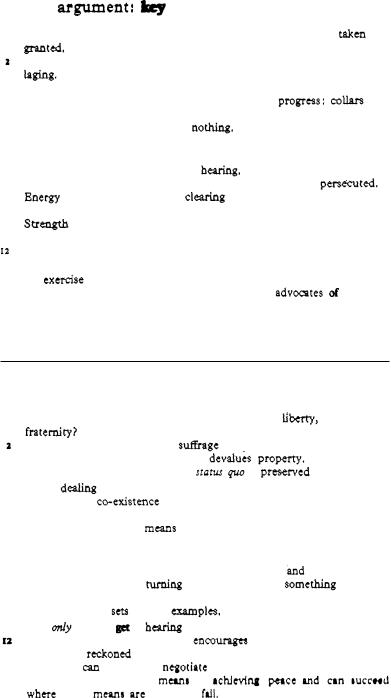
For & Against by L G Alexander
.pdf
The argument: key words
I Criminals should carry cards: Fragile: Handle With Care. 2 We mustn't refer to them as thugs, but as social misfits.
3Killer who murders old lady for savings needs 'hospital treatment'.
4'Society is to blame' argument - why aren't we all criminals?
5We have done away with absurdly harsh laws: that's enough.
6Suspension of capital punishment: senseless.
7Violent criminal: a hero figure.
8Glorified on screen and by press.
9Great demand for crime stories.
10Train robbers: a glorious resistance movement?
IICuddled by sociologists, adored by masses, the criminal is a privileged person.
12He expects and receives VIP treatment.
13Capital punishment was once a major deterrent: the robber, the poisoner.
14It protected unarmed policemen, young children.
IS Now the criminal can get away with murder.
16'Life sentence': ten years 'good conduct' and then freedom to live on the proceeds of crime.
17People hold liberal views at the expense of others.
18Were victims consulted before suspension of capital punishment? No: they were dead.
The counter-argument: key words
IWe shouldn't be blinded by emotional arguments: glorification of criminal on screen, etc., irrelevant.
2What are the facts? E.g. in Britain capital crime has not increased since suspension of capital punishment.
3This has been proved many times in the past: relaxation of harsh laws has never led to increase in crime.
4Therefore the 'deterrent' argument is absurd: capital punishment never protected anyone.
5Those in favour of capital punishment are motivated only by desire for revenge and retaliation.
6There has been a marked trend in society towards the humane treatment of less fortunate members.
7E.g. compare the treatment of the insane in the past with today.
8This same attitude characterises our approach to crime.
9Hanging, electric chairs, garotting, etc., are barbaric practices, unworthy of human beings.
10 |
Suspension of capital punishment is enlightened and civilised. |
I I |
Capital punishment creates, it does not solve problems. |
'12 Solution lies elsewhere: society is to blame.
13Overcrowding, slums, poverty, broken homes: these are the factors that lead to crime.
14Crime can only be drastically reduced by the elimination of social in- justices - not by creating so-called 'deterrents' when the real problems remain unsolved.
59




30'The most important of all human qualities is a sense of humour'
Biologically, there is only one quality which distinguishes us from animals: the ability to laugh. In a universe which appears to be utterly devoid of humour, we enjoy this supreme luxury. And it is a luxury, for unlike any other bodily process, laughter does not seem to serve a biologically useful
5purpose. In a divided world, laughter is a unifying force. Human beings oppose each other on a great many issues. Nations may disagree about systems of govemment and human relations may be plagued by ideological
factions and political camps, but we all share the ability to laugh. And laughter, in turn, depends on that most complex and subtle of all human
10qualities: a sense of humour. Certain comic stereotypes have a universal appeal. This can best be seen from the world-wide popularity of Charlie Chaplin's early films. The little man at odds with society never fails to amuse no matter which country we come from. As that great commentator
on human affairs, Dr Samuel Johnson, once remarked, 'Men have been
15wise in very different modes; but they have always laughed in the same way.'
A sense ofhumour may take various forms and laughter may be anything
from a refined tinkle to an earthquaking roar, but the effect is always the same. Humour helps us to maintain a correct sense of values. It is the one
20quality which political fanatics appear to lack. If we can see the funny side, we never make the mistake of taking ourselves too seriously. Weare always
reminded that tragedy is not really far removed from comedy, so we never get a lop-sided view of things.
This is one of the chief functions of satire and irony. Human pain and
25suffering are so grim; we hover so often on the brink of war; political realities are usually enough to plunge us into total despair. In such circumstances, cartoons and satirical accounts of sombre political events
redress the balance. They take the wind out of pompous and arrogant politicians who have lost their sense of proportion. They enable us to see
30that many of our most profound actions are merely comic or absurd. We laugh when a great satirist like Swift writes about war in Gulliver's Travels. The Lilliputians and their neighbours attack each other because they can't agree which end to break an egg. We laugh because we are meant to laugh; but we are meant to weep too. It is no wonder that in totalitarian regimes
35any satire against the Establishment is wholly banned. It is too powerful a weapon to be allowed to flourish.
The sense of humour must be singled out as man's most important
quality because it is associated with laughter. And laughter, in turn, is associated with happiness. Courage, determination, initiative - these are
40qualities we share with other forms of life. But the sense of humour is uniquely human. Ifhappiness is one of the great goals of life, then it is the sense of humour that provides the key.
64



